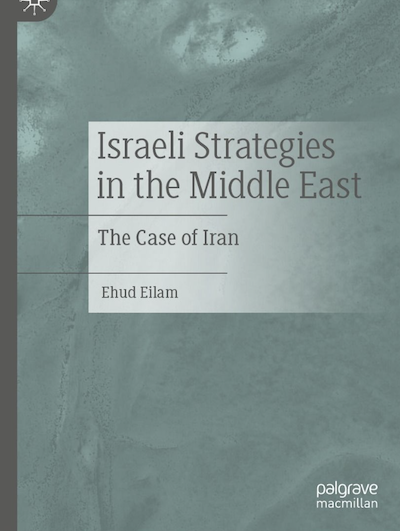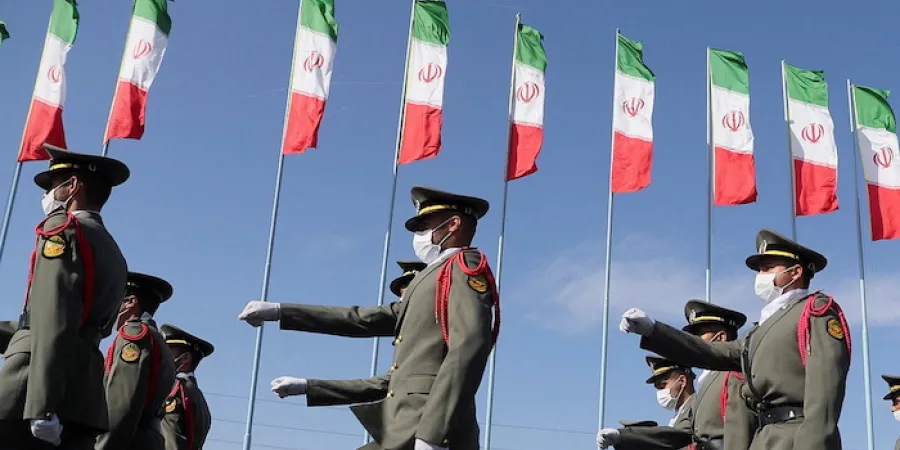Israeli Strategies in the Middle East: The Case of Iran – Book review
This book offers an in-depth discussion of the Israeli – Iranian conflict, and its implications for the United States and Arab states
IsraelDefense
|
20/04/2022
This book offers an in-depth discussion of the Israeli – Iranian conflict, and its implications for the United States and Arab states. The main topic is Israel’s approach to handling Iran and its partners, given Iran’s ambitions, including its plan to produce nuclear weapons.
The author explains the complexity of the Iranian-Israeli-Arabtriangle, while offering suggestions on how the United States can assist Israel in this matter. The volume also contributes a unique
point of view on events and military factors.
Ehud Eilam is a former private contractor for the Israeli Ministry of Defense, where for several years he conducted research in different branches of the Israeli Defense Forces.
Ambassador Frederic C. Hof, teaches at Bard College, Army officer (ret.) and former special adviser on political transition in Syria to Secretary of State Hillary Clinton:
“Anyone wishing to comprehend the tangled web of the Israel-Iran confrontation would do well to consult with Dr. Ehud Eilam, a top-drawer scholar and analyst. Israeli Strategies in the Middle East: The Case of Iran makes it clear that although Israel's chief
concern is a nuclear-armed Iran, there is much more in play. Iran's proxy in Lebanon, Hezbollah, possesses serious military capability.
“The collapse of the Syrian state has permitted Iran and Hezbollah to try to open a new anti-Israel front, something Jerusalem has opposed vigorously with a qualified nod from Moscow. And the multifaceted U.S.-Israel relationship remains key to Israel's strategy,
notwithstanding differences over the utility of a prospective renewed
and revised nuclear deal.”
Major General. (Ret.) Ran Goren, former Deputy Commander of the Israeli Air Force and Head of Manpower Directorate at the IDF General Staff:
“Iran is the most dangerous threat imposed over Israel's security, directly by its own powers and indirectly by its proxies. Iran's national ingredients – its radical fanatic Islamic regime; its
inspirations to extend its domination over the Middle East; its technological level which make it capable to develop and equip with advanced weapon systems; its support to terrorist organizations in Israel's vicinity and all over the world; and above all – its determined pursue to achieve nuclear capability, which may change essentially the balance of powers in the Middle East and impose existential threat on Israel – all these elements make Iran such a severe threat over Israel, at present and for long term in the future.
"This is a must-read book about the conflict between Israel and Iran and its implications for the Middle East and the United States. Author Ehud Eilam provides essential information and a highly valuable analysis of current security issues facing Israel from Iran and its proxies.
Professor Uzi Rabi, Director of the Moshe Dayan Center for Middle Eastern and African Studies, and senior researcher at the Center for Iranian Studies, Tel Aviv University:
“The book constitutes an important contribution to the scholarly literature of the complicated relationship between Israel and Iran. Ehud Eilam provides an in-depth examination of key national security aspects of Israel’s strategy toward Iran and its protégés. The book is essential for a better understanding of the new geopolitical architecture that had been shaped in the Middle East throughout the opening decades of the 21st century.
Louis René Beres, Purdue University. Former Chair of “Project Daniel” (2003), an early effort to identify viable Israeli remedies for the Iranian strategic threat:
“Dr. Eilam offers interested readers a fact-based and capable assessment of the Iranian strategic threat. Even more precisely, Eilam examines various plausible synergies between Iranian nuclearization and virulent Iranian proxies, especially Hezbollah. In this connection, inter alia, the author explores assorted points of convergence between the Israel-Iran conflict dyad and Hezbollah’s tangible connections to Syrian and Russian air forces.
“But things are changing. Looking ahead after Russia’s still-escalating war of aggression against Ukraine, prospects of continuing Russian-Israeli cooperation vis-à-vis Syria and Iran could become substantially less promising. As a considered Israeli endgame, Eilam clarifies that a defensive first strike against Iran remains “on the table,” and that, for Israel especially, the “Westphalian” system of world security remains oriented to self-help remedies. Whether
considered in compelling increments or in its entirety, as a singular whole, Israeli Strategies in the Middle East represents a very valuable addition to the pertinent analytic literature.
Efraim Karsh, Emeritus Professor of Middle East & Mediterranean Studies, King’s College London; Former director, The Begin-Sadat Center for Strategic Studies:
“During its forty-three years at the helm, the Islamist regime in Tehran has consistently subverted its neighbors, triggered the longest and bloodiest war in the Middle East’s modern history (with Iraq,1980-88), transformed Iran into the world’s foremost sponsor of terrorism, and poured billions of dollars into its nuclear weapons program at the expense of the economic wellbeing of ordinary Iranians.
“The implications of the possession of nuclear weapons by this murderous, messianic tyranny, reigning over one of the Middle East’s most powerful nations and committed to the world-conquering agenda of its founding father, Ayatollah Ruhollah Khomeini, are too horrendous to contemplate. Ehud Elam is to be congratulated for providing the definitive account of Israel’s Sisyphean effort to derail Iran’s dogged quest for the Bomb and tireless strive for regional hegemony. A must-read.”

This book offers an in-depth discussion of the Israeli – Iranian conflict, and its implications for the United States and Arab states
This book offers an in-depth discussion of the Israeli – Iranian conflict, and its implications for the United States and Arab states. The main topic is Israel’s approach to handling Iran and its partners, given Iran’s ambitions, including its plan to produce nuclear weapons.
The author explains the complexity of the Iranian-Israeli-Arabtriangle, while offering suggestions on how the United States can assist Israel in this matter. The volume also contributes a unique
point of view on events and military factors.
Ehud Eilam is a former private contractor for the Israeli Ministry of Defense, where for several years he conducted research in different branches of the Israeli Defense Forces.
Ambassador Frederic C. Hof, teaches at Bard College, Army officer (ret.) and former special adviser on political transition in Syria to Secretary of State Hillary Clinton:
“Anyone wishing to comprehend the tangled web of the Israel-Iran confrontation would do well to consult with Dr. Ehud Eilam, a top-drawer scholar and analyst. Israeli Strategies in the Middle East: The Case of Iran makes it clear that although Israel's chief
concern is a nuclear-armed Iran, there is much more in play. Iran's proxy in Lebanon, Hezbollah, possesses serious military capability.
“The collapse of the Syrian state has permitted Iran and Hezbollah to try to open a new anti-Israel front, something Jerusalem has opposed vigorously with a qualified nod from Moscow. And the multifaceted U.S.-Israel relationship remains key to Israel's strategy,
notwithstanding differences over the utility of a prospective renewed
and revised nuclear deal.”
Major General. (Ret.) Ran Goren, former Deputy Commander of the Israeli Air Force and Head of Manpower Directorate at the IDF General Staff:
“Iran is the most dangerous threat imposed over Israel's security, directly by its own powers and indirectly by its proxies. Iran's national ingredients – its radical fanatic Islamic regime; its
inspirations to extend its domination over the Middle East; its technological level which make it capable to develop and equip with advanced weapon systems; its support to terrorist organizations in Israel's vicinity and all over the world; and above all – its determined pursue to achieve nuclear capability, which may change essentially the balance of powers in the Middle East and impose existential threat on Israel – all these elements make Iran such a severe threat over Israel, at present and for long term in the future.
"This is a must-read book about the conflict between Israel and Iran and its implications for the Middle East and the United States. Author Ehud Eilam provides essential information and a highly valuable analysis of current security issues facing Israel from Iran and its proxies.
Professor Uzi Rabi, Director of the Moshe Dayan Center for Middle Eastern and African Studies, and senior researcher at the Center for Iranian Studies, Tel Aviv University:
“The book constitutes an important contribution to the scholarly literature of the complicated relationship between Israel and Iran. Ehud Eilam provides an in-depth examination of key national security aspects of Israel’s strategy toward Iran and its protégés. The book is essential for a better understanding of the new geopolitical architecture that had been shaped in the Middle East throughout the opening decades of the 21st century.
Louis René Beres, Purdue University. Former Chair of “Project Daniel” (2003), an early effort to identify viable Israeli remedies for the Iranian strategic threat:
“Dr. Eilam offers interested readers a fact-based and capable assessment of the Iranian strategic threat. Even more precisely, Eilam examines various plausible synergies between Iranian nuclearization and virulent Iranian proxies, especially Hezbollah. In this connection, inter alia, the author explores assorted points of convergence between the Israel-Iran conflict dyad and Hezbollah’s tangible connections to Syrian and Russian air forces.
“But things are changing. Looking ahead after Russia’s still-escalating war of aggression against Ukraine, prospects of continuing Russian-Israeli cooperation vis-à-vis Syria and Iran could become substantially less promising. As a considered Israeli endgame, Eilam clarifies that a defensive first strike against Iran remains “on the table,” and that, for Israel especially, the “Westphalian” system of world security remains oriented to self-help remedies. Whether
considered in compelling increments or in its entirety, as a singular whole, Israeli Strategies in the Middle East represents a very valuable addition to the pertinent analytic literature.
Efraim Karsh, Emeritus Professor of Middle East & Mediterranean Studies, King’s College London; Former director, The Begin-Sadat Center for Strategic Studies:
“During its forty-three years at the helm, the Islamist regime in Tehran has consistently subverted its neighbors, triggered the longest and bloodiest war in the Middle East’s modern history (with Iraq,1980-88), transformed Iran into the world’s foremost sponsor of terrorism, and poured billions of dollars into its nuclear weapons program at the expense of the economic wellbeing of ordinary Iranians.
“The implications of the possession of nuclear weapons by this murderous, messianic tyranny, reigning over one of the Middle East’s most powerful nations and committed to the world-conquering agenda of its founding father, Ayatollah Ruhollah Khomeini, are too horrendous to contemplate. Ehud Elam is to be congratulated for providing the definitive account of Israel’s Sisyphean effort to derail Iran’s dogged quest for the Bomb and tireless strive for regional hegemony. A must-read.”




